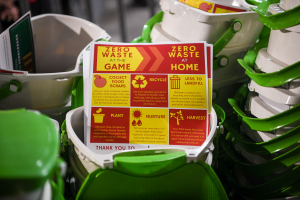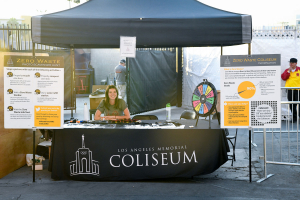When fans come to the Los Angeles Memorial Coliseum, they are supporting more than a victory for the USC Trojans – they’re taking part in a sustainability effort that has helped push the stadium past the zero waste goal line. For a stadium with a capacity of more than 75,000, that is no small feat. Our venue ranks as one of the most sustainable stadiums in the country. See how the stats stack up.
What is Zero Waste?
Zero waste is achieved when 90 percent or more of waste materials are diverted from landfills through recycling or composting. (Why not 100 percent? Because some fans bring their own non-compostable products.)
1,200 tons
Since 2015, our sustainability efforts have diverted over 1,200 tons of game day waste from the landfill.
During the 2021 football season, the Coliseum’s zero waste program successfully achieved an 86% waste diversion rate. Of the 74 tons of waste generated in the stadium during the season, approximately 64 tons were recovered through recycling and composting practices. A total of 24 tons of compost has been recovered, and 40 tons of material has been recycled, compared to just 10 tons of waste sent to the landfill.
In 2022, the Coliseum was the Pac-12’s Zero Waste Challenge Winner for the third time.
80-145 staff members
These massive accomplishments are achieved through many helping hands. Every game day, 80-145 custodial and staff members assist with zero waste goals alone.
48 hours
It takes two full days to process waste from a single game. However, when we host back-to-back full-stadium events, our team turns around the clean-up and waste diversion in as few as eight hours.
We’re #1 (and #2)
The Los Angeles Memorial Coliseum is the largest stadium in the Pac-12 and the second-largest college stadium in the United States to achieve zero waste.
Our zero waste partners include our janitorial partner ABM, our waste hauler Republic Services, our recycle hauler Recycling Pays, and our concessionaire Legends Hospitality, along with BASF, EcoSafe Zero Waste, USC Office of Sustainability and Waxie Sanitary Supply Co. Together, we have accelerated stadium greening.
Sustainability in Education, Research, and Operations
President Carol Folt has positioned USC as a leader in sustainable practices and has made sustainability a core part of its curriculum, fostering global citizens who will fight climate change.
Teams from across the university have established a vision, aspirations and goals for USC across five domains: Education, Research, Equity and Inclusion, Operations, and Engagement. Assignment: Earth formalizes our commitment to addressing climate change and creating a more sustainable future. It will guide our actions through 2028 and beyond and enable us to adapt to innovations and new solutions as they emerge.
As part of that effort, the Coliseum and our partners have executed a “first of it’s kind” cross-campus beverage pouring agreement and sponsorship that incorporated USC’s sustainability goals and priorities, including the elimination of single-use plastic beverage bottles.
USC Athletics has become the 5th US university to sign on to the UNFCCC’s Sports For Climate Action Framework Agreement.
Awards
2023 CRRA Outstanding Practices in Venue/Event Resource Recovery Award
2022 Green Sports Alliance Net Zero Waste Champion
2021 Pac-12 Zero Waste Challenge Champion
2020 ENR California Best Renovation/Restoration Project
2019 Pac-12 Zero Waste Challenge – Overall Winner, Co-Champion
2019 Green Sport Alliance Environmental Innovator of the Year
2018 CRRA Outstanding Practices in Venue/Event Resource Recovery Award
2018 National Designation as a World War I Centennial Memorial
2017 NECA Los Angeles Electrical Excellence Award (Field Lighting)
2017 Pac-12 Zero Waste Bowl Champion
2016 Pac-12 Zero Waste Bowl Champion
2015 Pac-12 Zero Waste Bowl Most Improved
1984 Official Designation as a National and State Historic Landmark
1968 Re-Dedicated as a World War I Memorial

